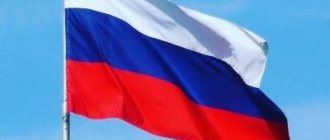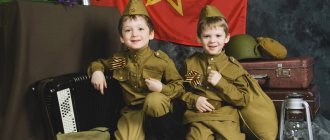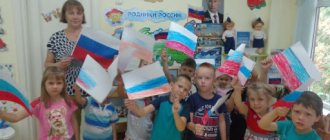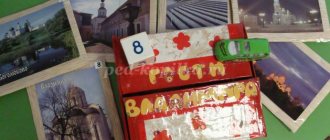Short-term project for children of the middle group “My Motherland is Russia”
Zilya Makhmutova
Short-term project for children of the middle group “My Motherland is Russia”
Project “My Motherland - Russia ”
Type of project : educational, short-term , group .
Project implementation time : 2 weeks.
Project participants : middle school , teacher, parents .
Relevance:
“A person cannot live without his homeland ,
how you can’t live without a heart.”
K. Paustovsky
From the first years of a child’s life, introducing him to culture and universal human values helps lay in him the foundation of morality, patriotism, and forms the foundations of self-awareness and individuality. Our children must know the traditions of national culture, be aware, understand and actively participate in its revival, self-realize themselves as individuals who love their homeland , their people and everything connected with folk culture - this forms a stable attitude towards the culture of their native country, creating an emotional a positive basis for the development of patriotic feelings.
One of the educational tasks in the middle group is to familiarize children with the world around them , with the society in which children live. The solution to this problem is carried out in everyday communication with children, both in everyday life and in the process of educational activities. Moreover, the main work is carried out precisely in everyday life and routine moments. Introducing children to the origins of folk culture has not lost its importance even today. The main condition that ensures the quality and result of educating preschoolers on the ideas of folk pedagogy is the interaction of the teacher, music director, and parents .
The goal of the project : to form in the imagination of children the image of the Motherland , the idea of Russia as a native country , and to cultivate patriotic feelings.
Project objectives :
1. Expand and systematize children’s knowledge about Russia , about its symbols (coat of arms, flag, anthem)
.
2. Introduce children to the different peoples inhabiting Russia . Encourage children to respect the cultures of different peoples.
3. To arouse in children interest in folk art, admiration for the talent of the Russian people and pride in their people.
4. To form an idea of Moscow as the main city of our country.
5. Strengthen children’s ideas about the family , its members, and family relationships.
6. Expand children's knowledge about professions .
7. Form in children a respectful attitude towards their country.
8. Foster a sense of love and pride for your homeland , for your fellow countrymen.
9. Foster civic-patriotic feelings.
Stages of work.
1. Preliminary stage.
Drawing up a plan for joint work with children, teachers and parents : selection of materials and equipment for educational activities, conversations, role-playing games with children; selection of songs, dance compositions, finger games, physical exercises related to the theme of the project ; design of moving folders on the topic of the project , selection of information, illustrations, literature; conversations with parents about their necessary participation in the project .
2. Main stage.
1. A series of classes that expand the understanding of one’s native country:
• Introduce Russian .
• Look at the map of Russia .
• The capital Moscow is the main city of Russia .
• A story about holidays and customs of Russia .
• About our small homeland : “We are telling a story about our city”
.
2. Looking at albums with photographs “My poplar Varna”
,
“Our kindergarten”
,
“Moscow”
,
“Russian patterns”
.
3. Didactic games: “Coat of arms of Russia ”
,
“Flag
of Russia ” ,
“Name the family members”
,
“Professions”
,
“Trip around the city”
,
“Lay out along the contour”
,
“Cut pictures”
(Family, Professions, Russian patterns,
“Who needs what for work?”
,
“ Russian nesting dolls”
,
“Peoples
of Russia ” ,
“Defenders of the Fatherland”
,
“The house where I live”
,
“Wild animals of our country”
.
4. Outdoor games: “Golden Gate”
,
“Burn, burn clearly!”
,
“Boot”
,
“Raven”
,
“Fifteen”
.
5. Compiling stories about your family, looking at family albums.
6. Telling Russian folk tales “The Ryaba Hen”
,
“Teremok”
,
“Kolobok”
,
“The Fox and the Wolf”
.
7. Finger games “We are funny nesting dolls”
,
“Family”
,
“Our
Motherland ” ,
“Kindergarten”
.
8. Role-playing games - traveling by train, plane, car.
9. Presentation “Russian hut”
10.Drawing: “My house”
,
“Apron decoration for mom”
.
11. Coloring book “Family”
,
“Home”
12. Modeling “Pies for a family celebration”
13. Collective application “Flag of Russia ”
.
14.Construction: “My Street”
.
15. Proverbs, sayings, riddles about the Motherland , family.
16. Memorizing poems and songs about Russia , about kindergarten.
17. Reading fiction: Therapeutic tales about kindergarten, Russian folk tales, M. Prishvin “My Motherland ”
, K. Paustovsky
“Collection of Miracles”
, E. Permyak
“Fairy tale about our native Urals”
.
Working with parents :
Consultations “The role of parents in the revival of Russian traditions”
,
“Heroes of the Russian Land”
, “The role of the father in the family:
“Play with me, dad!”
,
“Raising a happy baby
.
Organization of the exhibition “Family Photo Albums”
Participation in the drawing competition “ Russia through the eyes of children ”
.
3. Final stage.
Quiz: “What do we know about Russia ”
.
Exhibition of drawings made together with parents “ Russia through the eyes of children ”
.
Conclusion:
The implementation of the project allows not only to increase children's interest in their country , but also contributes to the formation of a truly civic-patriotic position among preschoolers, which will then form the basis of the personality of an adult - a citizen of his country.
Of course, within the framework of one project it is not possible to cover all the problems of patriotic education in the educational space of preschool educational institutions. The project showed the need for further work in this direction.
Article “Russia is my Motherland!” patriotic education of children in a preschool institution
Rybakova Irina Viktorovna
MBDOU "Yurinsky kindergarten "Teremok"
teacher
Russia is my Motherland!
Carrying out patriotic events is very important in educating the younger generation, because the formation of attitudes towards one’s country begins from early childhood. Knowledge about the Motherland and its history acquired in preschool childhood arouses in children a deep, sincere interest in it, expands their knowledge, and contributes to the formation of character and love for their Motherland.
In our country there is such an important holiday as National Unity Day.
On the eve of this holiday, in the middle group “Ezhata” a project work “Day of National Unity” was carried out, aimed at solving the problem of developing elementary ideas about Russian holidays in children. Children 4-5 years old have not yet developed knowledge about Russian heroes, national traditions, the history of Russian holidays, and children have a small amount of knowledge about the Motherland, state symbols (coat of arms, anthem, flag).
As part of the project, the children had conversations about the upcoming holiday, the symbols of Russia, the Republic of Mari El and their native village, got acquainted with the anthem of Russia and the Republic of Mari El, and also carried out direct educational activities on the FCCM on the topic “Our Motherland”; they made an application on KHER “A boat is sailing on the river,” they painted Russian flags in gouache, and made a creative collective poster “Russia! We are proud of you" and many other events. The main event was the holding of the themed holiday "National Unity Day", where Vovka and Vasilisa the Wise from the fairy tale "The Kingdom Far Away" came to visit the children. The children enjoyed reading poems about Russia, singing songs, dancing together, playing active folk and musical games, and competing. Such an event once again reminded us all of our common roots and helped us realize that the unity of peoples at all times has been and remains the main idea of Russia.
As a result, the work turned out to be voluminous and informative. Project activities helped children master and comprehend the new knowledge that they received during all the activities. By expanding their horizons and ideas about national holidays, the patriotism of children has increased. They acquired specific knowledge about our country, which they gladly shared not only with their peers, but also with adults - parents and teachers.
My country is my Russia
Needed where was born! Every person has a homeland. Our homeland, like our parents, is not chosen; it is given to us at birth.
For me, my homeland is the place where I was born, these are my parents and relatives. Every person who has a homeland is happy.
Russia is the country in which I was born and live, which means this is my Motherland. This is the homeland of my ancestors. Russia is rich in its nature: forests and fields, rivers and lakes. There are many beautiful villages, towns and cities in Russia. But the most important wealth lies in people who are hardworking, kind, hospitable, courageous, heroic, creative and sympathetic.
My country is free and peaceful. In it, people work and study as they wish. They do what they love, raise children. In our country, peace is the main thing.
My country takes care of its people: it provides free treatment in hospitals, free education for children in schools and institutes. It’s good for us to live in such a country! Our military - the defenders of the Motherland - protect people from enemies so that there is always a peaceful sky above their heads.
If there is peace in my country, then people will feel good. And if people feel good, everyone will be friends, everyone will be satisfied and happy.
I love my Motherland very much, I want it to become more and more beautiful and better, so that Russians take care of it, work for the good of the Motherland, for the good of society. If Russia is rich, we will all live well!
“Russia did not begin with a sword, it began with a scythe and a plow. Not because the blood is not hot, but because the Russian shoulder has never been touched by malice in my life...
And my country is forever strong because it has never humiliated anyone anywhere. After all, kindness is stronger than war, just as selflessness is more effective than a sting. The dawn rises, bright and hot. And it will be so forever and indestructibly. Russia did not begin with a sword, and therefore it is invincible!”
Russia is a state with a federal structure . A multinational country unites subjects, but they all have the same citizenship - Russians. To understand the structure of the country, they start with the concept of “federation”. This is an alliance. The subjects united into one state: republics, territories, regions.
The state has one law - the Constitution of the Russian Federation . Each subject has its own powers and rights. Laws adopted in the constituent entities are subject to the Constitution and cannot contradict it.
Another unifying feature is the language of the state . The Russian language is studied throughout Russia. Documents are written on it. This does not mean that other languages cannot exist. The languages of the outskirts and small nationalities are supported by the state. Russian is a common language that is used by everyone.



